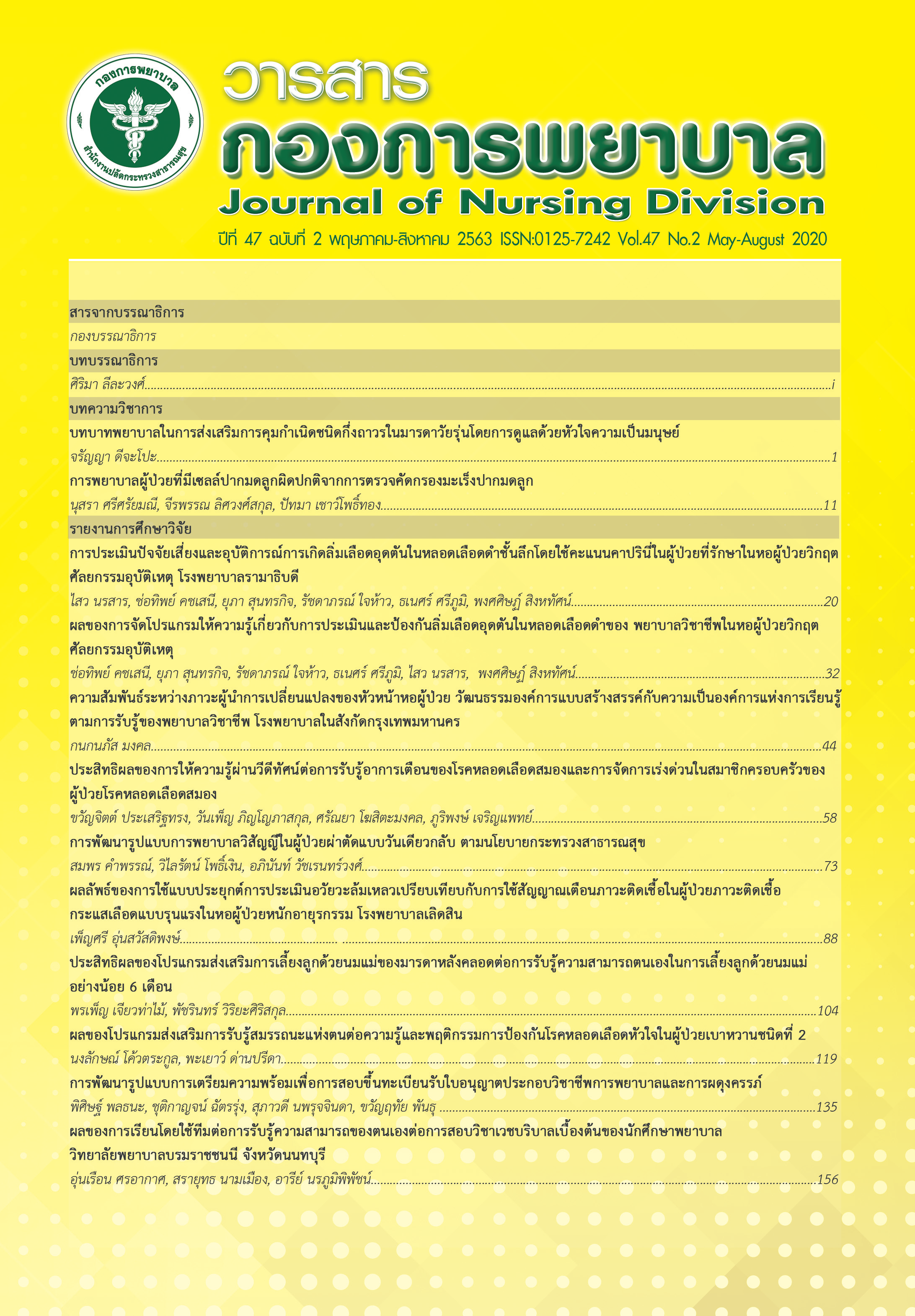ประสิทธิผลของโปรแกรมส่งเสริมการเลี้ยงลูกด้วยนมแม่ของมารดาหลังคลอดต่อการรับรู้ความสามารถตนเองในการเลี้ยงลูกด้วยนมแม่อย่างน้อย 6 เดือน
Main Article Content
บทคัดย่อ
การส่งเสริมมารดาหลังคลอดที่ขาดความมั่นใจในการเลี้ยงลูกด้วยนมแม่เป็นสิ่งสำคัญ ที่จะช่วยให้มารดาหลังคลอดสามารถเลี้ยงลูกด้วยนมแม่ได้อย่างน้อย 6 เดือน การวิจัยกึ่งทดลองนี้มีวัตถุประสงค์เพื่อศึกษาผลของโปรแกรมส่งเสริมการเลี้ยงลูกด้วยนมแม่ของมารดาหลังคลอดต่อการรับรู้ความสามารถตนเอง ความคาดหวังในผลลัพธ์เมื่อเลี้ยงลูกด้วยนมแม่อย่างน้อย 6 เดือน และพฤติกรรมการเลี้ยงลูกด้วยนมแม่ โดยประยุกต์ทฤษฎีการรับรู้ความสามารถตนเอง กลุ่มตัวอย่างได้แก่มารดาหลังคลอดปกติ แบ่งเป็น 2 กลุ่มๆ ละ 33 คน วัดผลก่อนและหลังการทดลอง กลุ่มทดลองเข้าร่วมกิจกรรมการรับรู้ความสามารถตนเอง ระยะเวลา 6 สัปดาห์ ร่วมกิจกรรม 6 ครั้ง รวบรวมข้อมูลโดยแบบสอบถาม 4 ส่วนคือ ข้อมูลทั่วไป การรับรู้ความสามารถตนเอง ความคาดหวังในผลลัพธ์เมื่อเลี้ยงลูกด้วยนมแม่อย่างน้อย 6 เดือน และพฤติกรรมการเลี้ยงลูกด้วยนมแม่ วิเคราะห์ข้อมูลโดยการแจกแจงความถี่ ร้อยละ เปรียบเทียบความแตกต่างด้วยสถิติ Chi-square Independent t-test และ Paired Samples t-test
ผลการศึกษาพบว่าภายหลังการทดลอง กลุ่มทดลองมีคะแนนเฉลี่ยการรับรู้ความสามารถตนเอง ความคาดหวังในผลลัพธ์ของการเลี้ยงลูกด้วยนมแม่อย่างน้อย 6 เดือน และพฤติกรรมการเลี้ยงลูกด้วยนมแม่ สูงกว่าก่อนการทดลอง และสูงกว่ากลุ่มควบคุมอย่างมีนัยสำคัญทางสถิติ (p<.001) แสดงให้เห็นว่า โปรแกรมส่งเสริมการเลี้ยงลูกด้วยนมแม่ของมารดาหลังคลอด มีประสิทธิผลทำให้มารดาหลังคลอดรู้สึกเชื่อมั่นถึงความสามารถของตนเอง และผลลัพธ์ที่จะเกิดขึ้นเมื่อเลี้ยงลูกด้วยนมแม่อย่างน้อย 6 เดือน จึงมีการเปลียนแปลงพฤติกรรมการเลี้ยงลูกด้วยนมแม่สูงขึ้นภายหลังการทดลอง
Article Details
เอกสารอ้างอิง
2. Ladomenou F, Moschandreas J, Kafatos A, Tselentis Y and Galanakis E. Protective effect of exclusive Breastfeeding against infections during infancy: A
prospective study. Arch Dis Child. 2010;95(12):1004-8.
3. Alden K. Newborn nutrition and feeding. In D. Lowdermilk and L. Perr. Maternity nursing. 7th ed. St Louis: Mosby Elsevier; 2006.
4. Kusuma Chusilpa. The International criteria of the baby-friendly hospital. Bangkok: Ayara Publishing Company Limited; 2005. Thai.
5. World Health Organization. Ten steps to successful breastfeeding (Revised 2018). Geneva: WHO Document Production Service; 2018.
6. National Statistical Office. Multiple indicator cluster surveys Thailand 2011-2012. Bangkok: National statistical office; 2012. Thai.
7. Khanittha Panyim. Effectiveness of implementing best practice guidelines for breastfeeding Promotion, phobphrah Hospital, Tak Province. [Thesis].
Chiangmai: Chiangmai University; 2012. Thai.
8. Chulalak Khamkoed. Self-esteem and breastfeeding practice among poatpartum mother at King Chulalongkorn Memorial Hospital. [Thesis]. Bankok:
Chulalongkorn University; 2016. Thai.
9. Chayapa Chisuwan. Predictive power of support from husband, grandmother and nurse on duration of Exclusive Breastfeeding. [Thesis]. Bankok: Mahidol
University; 2012. Thai.
10. Jettapon Sangkla. Factor associated with exclusive breastfeeding: A case study in a semi- urban area, Kanchanaburi. [Thesis]. Bankok: Mahidol University;
2013. Thai.
11. Patharaporn Chuprapan. Factors influencing exclusive breastfeeding within a 6 months’Period among mothers in south central region of Thailand. [Thesis].
Bankok: Chulalongkorn University; 2013. Thai.
12. Panatchakorn Fongmoon. Reflection from mothers facing difficulties in breast feeding. [Thesis]. Bankok: Mahidol University; 2011. Thai.
13. The Breastfeeding Center of Thailand Foundation. 4 years the family bond of love project begins with breast milk to improve the Quality of Life of Thai
society. Newsletter 2010; 6 (special edition). Thai.
14. Bandura, A. Self-efficacy the exercise of control. New York: W.H. Freeman; 1997.
15. Benjapak Sanghuaiprai. The effect of the percieved self-efficacy promoting programe on breastfeeding behavior of postpartum mothers at
Somdejpranangchosirikit Hospital. [Thesis]. Chonburi: Burapha University; 2011. Thai.
16. Nopparat Tharana, & Rattanaporn Thanasirijiranon. Effects of enhancing self-efficacy program on perceive self-efficacy, knowledge and satisfaction in
breastfeeding among first-time postpartum mothers. [Research report]. Chaingmai: Payap University; 2019. Thai.
17. Manatchanok Kulaphanich. Effect of self-efficacy enhancement on breastfeeding among adolescent mothers. [Thesis]. Chiangmai: Chiangmai University;
2017. Thai.
18. Pimchanok Boonchalerm. Effect of the mother-preterm infant preparation program on breastfeeding self-efficacy and sucking quality. [Thesis]. Bankok:
Mahidol University; 2012. Thai.
19. Donya Rojanasheeva. The result of nursing management of knowledge providing pattern for breast feeding Primi-para Mothers at the teriary hospital in
Suphanburi Province. [Thesis]. Nakonpathom: Christian University; 2012. Thai.
20. Aphiradee Khimpitak. The effect of breastfeeding Self-efficacy intervention in fist-time mothers. [Thesis]. Bankok: Mahidol University; 2013. Thai.
21. Nopparat Lakornket. The effectiveness of promoting breastfeeding self-efficacy program on sufficient of breast milk supply and maintenance of lactation
behavior in mother of newborn after exploratomy. [Thesis]. Bankok: Chulalongkorn University; 2015. Thai.
22. Nuanjun Phaiboonbunpot. The effects of breast feeding promotion program towards knowledge attitude and skill on breast feeding among postpartum
women. Thesis]. Khonkan: Khonkan University; 2013. Thai.
23. Sujittra Yaungthong. The effect of breastfeeding promoting program for first-time postpartum mothers on breastfeeding duration and behaviour.
[Thesis]. Chonburi: Burapha University; 2012. Thai.


